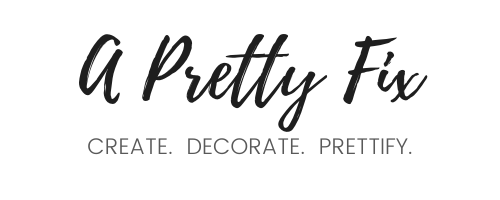Today, I’m super excited to be sharing this not-so-well-kept-secret about weaving: All you REALLY need are these EIGHT Items To Start Weaving This Weekend!
If you have ever seen a wall weaving and thought “I’d like to try that!” then you’ve landed on the right blog post! I’ve been weaving for about five years now and LOVE sharing my passion for this craft with anyone who’ll listen (or, in this case, read)! But while there are a lot of cool new tools you can purchase to start your first (or your 5th or 10th!) weaving project, all you really need are these 8 ITEMS to start weaving this weekend.
Now, isn’t that good news for us crafters?
~The following contains affiliate links at no extra cost to you. See my disclosure policy here.~
THE EIGHT ITEMS YOU NEED TO START WEAVING THIS WEEKEND
1. LOOM

You can always begin with a DIY cardboard loom that I used in this coaster project, but I would recommend that you eventually get a sturdy wooden frame loom. There are plenty of affordable (and not-so-affordable) options, so let me point you to just a few budget-friendly ones here:
- Harrisville Lap Loom (My first loom was a well-loved Harrisville loom)
- Milward Beech Extendable Loom (I personally own this and love it)
- Multi-Craft Weaving Loom
You can also DIY a wooden frame loom. I show you EXACTLY how to make one in the link below:
2. WARP YARN

The yarn that you choose to create the vertical strands (i.e., the framework of your weaving) is called a “warp.” When you weave, you’ll be taking yarn and sliding it horizontally across this warp, so your warp yarn will need to be strong, sturdy, and flexible.
Cotton yarn is my favourite to work with and can withstand friction and any tension you create as you weave.
My favourite to work with – and one that’s great for beginners, too, – is this one:
You can also try a slightly thinner cotton yarn like this one:
- Durable Loom 8/4 Cotton Warp Thread by Paper Farm (great for tapestries or rug-making)
3. WEAVING YARN

Choosing yarn is where you get to experiment and have fun with your colours and weights. And if are familiar with yarn or craft with it already, then you’ve probably got some at home already.
Here are a few tips when selecting yarn for weaving:
Beginner weavers: if you are on a tight budget, use acrylic or acrylic blends (preferably). Blends will stack better than pure acrylic.
The best budget-friendly acrylic blend yarns can be found on Amazon or at your local craft store. Start with these brands:
Intermediate weavers: use acrylic blends and/or 100% plant or animal-based yarn (e.g., wool, alpaca, cotton, etc)
Here are 5 online shops you can try out:
And remember! If you’ve got a local craft store nearby like Michaels or Hobby Lobby, there are so many yarn varieties there to choose from!
4. WEAVING NEEDLE

A tapestry needle is absolutely essential for any weaver.
I suggest purchasing ONE long needle and ONE bent tip needle, as follows:
- 5-Inch Tapestry Needle (great for getting across the warp quicker)
- 2.75-Inch Bent Tip Tapestry Needle (great for stitching, tight spaces, or weaving in ends)
The two needles are my personal favourites.
However, you can also purchase weaving needles of various lengths in kits like this kit or this kit on Etsy.
5. SCISSORS

If you’re on a budget, any kitchen scissors will do. But, it’s always good to get scissors dedicated to crafting:
- 8-Inch Craft Scissors (My go-to craft scissors; sharp and versatile)
- Small Thread Snips – (Love these – great for tighter spots)
6. WEAVING COMB

For the budget-conscious, using a kitchen fork (as I’ve done for years) is perfect. It will not impact the quality of your weaving.
But if you’d like to stop raiding the kitchen each time you want to weave, you’ll want to invest in a:
- Weaving comb (no handle – a recent purchase of mine that has become an essential tool now)
OR
- Tapestry beater (with handle) – lots to choose from on Etsy
7. DOWEL

Once you are ready to remove your piece from the loom, you’ll want to have a dowel on which you can hang your creation.
My favourites to use are smooth, wooden dowels as well as driftwood. But you can also try copper pipes or even branches from the great outdoors!
Many Etsy shops carry dowels of all sorts. Click below to see all that’s offered:
8. TUTORIALS!
Last but not least, you’ll want to read or watch tutorials online to guide you as you weave.
To get started, see my round-up of weaving tutorials right here on the blog:
No matter what supplies you ultimately choose, these tutorials will teach you all the basics of weaving from ‘warping’ your loom, to learning basic weaving techniques, to finishing a weave and hanging it up.
Before you know it, you’ll be a weaving pro!
Happy Weaving
![]()
If you found this post valuable, check out these 4 must-watch tutorials on My YouTube Channel:
VIDEO #1: Go-To Weaving Tools & Supplies I Use At Home
VIDEO #2: Weaving Tutorial: Rya Loops
VIDEO #3: Weaving Tutorial: The Hemstitch
VIDEO #4: Circle Weaving For Beginners


No Comments